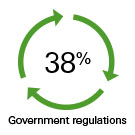

Sustainability
Businesses are putting commitments into action through their supply chain.
Firms that align their business models to the transition will be rewarded handsomely. Those that fail to adapt will cease to exist.
The trend towards sustainability is only accelerating for businesses around the world.
As previous Navigator reports note, environmental sustainability now permeates all aspects of business strategy. The current crisis has not caused firms to backtrack or change focus. This underlines how environmental sustainability is increasingly synonymous with business sustainability. Those who claimed to be well prepared for recent uncertainty place greater emphasis on sustainability. They also understand sustainability to be more wide-ranging than those who were less prepared.
There is a near unanimous commitment among business decision makers to build back better; more than 9 out of 10 agree that the need to reassess or review their operations would allow them to rebuild their businesses on firmer environmental foundations. This underlines how sustainability is a key component of future business strategy.
This emphasis on sustainability is consistent or strengthening for 2 in 3 businesses (65%). It is a higher priority for international than domestic companies, and firms based in mainland China and Hong Kong.
Anticipated sources of pressure to become more sustainable in the next 1-2 years




91%
of companies agree that the need to reassess their operations would allow them to rebuild on firmer environmental foundations
27%
intend to make their supply chain more environmentally sustainable in the next 1-2 years
Notably, consumer-facing industries such as textile and food and drink industries place a particular emphasis on sustainability.
Beyond supporting business resilience, the low-carbon transition is also creating growth opportunities. Companies are responding to rising expectations among customers, shareholders and wider society.
The data show businesses are feeling the greatest pressure from customers, suggesting that sustainability credentials are an opportunity to win new business rather than simply meet regulatory requirements. This is important because consumers – and particularly millennials – favour sustainable products and companies that share their values.
While external pressures weigh more heavily, around 1 in 3 businesses recognise the importance of sustainability to their employees. Sustainability therefore goes beyond winning new business to shaping the culture of an organisation.
Businesses are putting commitments into action through their supply chain. Promoting sustainability is a key reason for change within supply chains. Half of those businesses doing so cite environmentally conscious or ethically motivated consumers as a key factor.
Contact us








